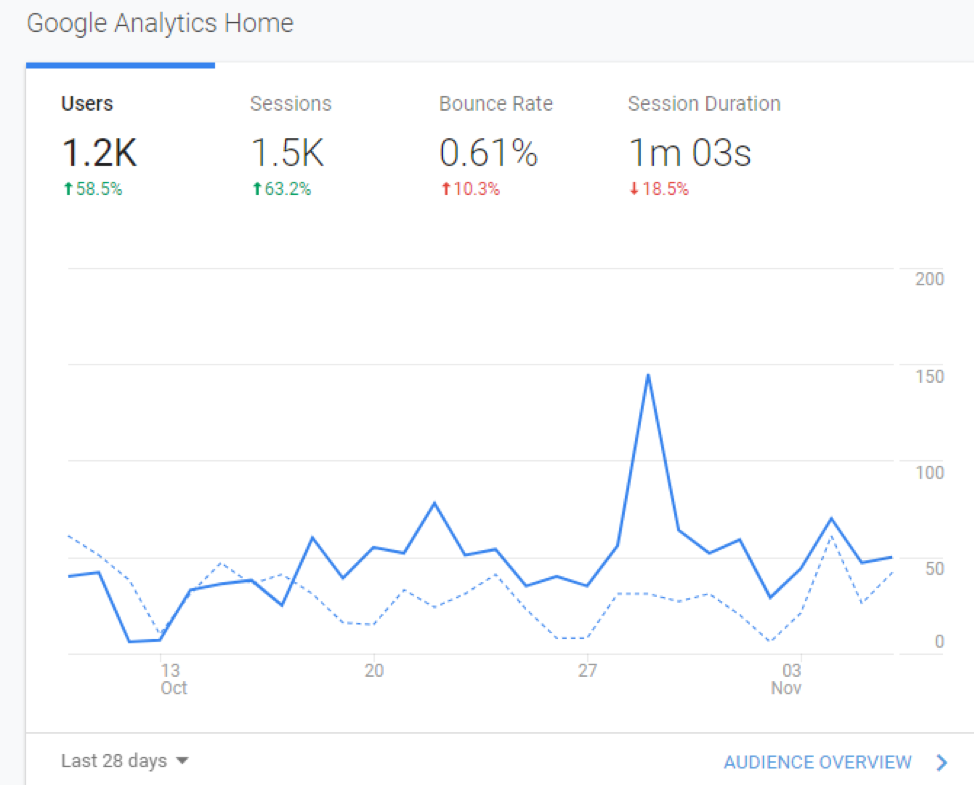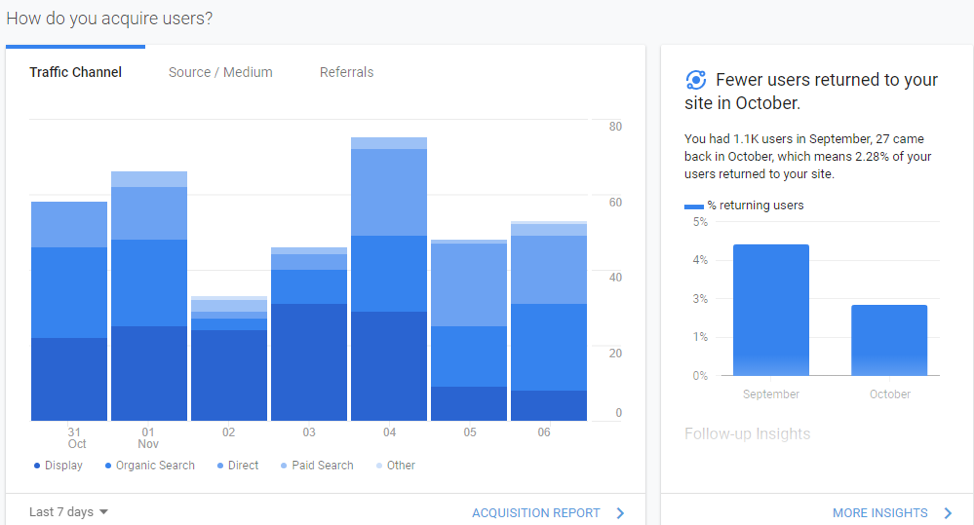What are Website Analytics Consulting Services?
Website analytics consulting services helps your organization implement a solution that measures your digital marketing performance, and improve upon the necessary areas.
There’s a saying that goes something along the lines of “what gets measured, gets improved.”, and that is your overall go when diving into website analytics.
By leveraging code on your site to give you overall statistics, the data should begin to tell a story on what is working well, and where there’s room for improvement.
Implementing a Website Analytics Strategy
The most common way this is done is through google analytics. By leveraging a website analytics consulting service, a developer will insert a google ‘tag’ on your site that will track activity on your pages including but not limited to:
- How visitors are getting to your site (terms searched, referral links, paid ads, etc.)
- What users are doing once they’re on your site
- How long they’re staying
It’s important to keep in mind that if you’re not yet doing this, most of your competitors probably are. This is the foundation to leveraging data analytics but it doesn’t stop here.
Data to Interpret
There’s a lot of data to read, but it needs to be interpreted correctly in order to improve upon it. Below highlights some of the datasets that you’ll be able to analyze:
- Referring domains (websites that refer users to your site)
- Organic traffic (how many users reach your site by leveraging a search engine)
- Paid traffic (how many users are seeing ads that you’re paying for)
- Authoritative Keywords (which words/terms drive traffic)
The above examples are just a small portion of all the data that you’re able to pull, but you can see that it’s already a lot to take in. Let’s dive into them a bit further.
Referring domains – here you’re looking at other websites that are referring users to your site. As part of your SEO strategy, referring domains are important. In terms of analyzing the referring domains, you want quality over quantity. There are many tools that enable you to analyze a referring site’s authority, and MOZ domain authority checker is a great place to start.
Organic traffic – users that are naturally (marketers use the term ‘organically’) finding your website by leveraging search engines are also captured by using analytics. The key here is that you’re now able to see which keywords users are using to find your website, and ensure that those keywords align with your organizations core offering. If the keywords don’t align, then you now have the insight to realign your messaging.
Paid traffic – you’ve seen the ads on the top and bottom pages of google after you search for something. This shows that companies have identified keywords that you search for, and are bidding to gain your attention. Unfortunately, the highest bidder is usually one of the first listings you’ll see and that doesn’t necessarily mean that the listing will provide you the most value. This can bring short term wins to your firm when you deploy an ad strategy that makes sense for your business.
Authoritative keywords – this term simply means that you’ve proven value and the ability to drive traffic to your site based on select keywords with ‘authority’. There are a number of key factors that play into establishing authoritative keywords, but that discussion is for a later date. An effective analytics strategy will enable you to see what those keywords are, and improve upon keywords without authority.
Interpreting the Data
Now we’ve only scratched the surface in terms of all of the aspects you’ll look at in your website analytics strategy; so how the heck do you keep up with all of the data?
When you first set up your google analytics account, you’ll see a dashboard that looks like this:

and this

And a little bit more of this
Can’t forget about this
Ok that’s enough, the point is that there’s so much data to consume just based on website traffic, and this doesn’t even take into account any ad spend you may have implemented or social media analytics.
So how do effective marketers track all of this?
Google Data Studio is a great start. It enables you to build custom reporting that is specific to the source (Website, YouTube, LinkedIn, Twitter, etc.) and combine them into a dashboard so that the analytics are connected together and begin to tell a story.
Examples:
I notice my website conversions increase when I post videos to YouTube.
YouTube videos perform much better when we’re talking about analytics for less than 10 minutes.
LinkedIn engagement decreases whenever we post on a Friday after 2pm.
Ad spend doesn’t lead to any conversions on Saturday or Sunday.
The examples used above are all real statistics that have applied to multiple businesses that we’ve worked with, although that’s not to say they will apply directly to your business.
Whether you execute internally or leverage website analytics consulting services, data insights can greatly benefit your businesses’ long term digital marketing strategy.
Contact us to learn more.

Gary McConnell Co-founded Rubicom Digital in 2019 with a goal of providing digital marketing consulting services in the B2B space.
Gary continues to serve as the Marketing Director of a Data Center-focused IT Provider, VirtuIT Systems.
